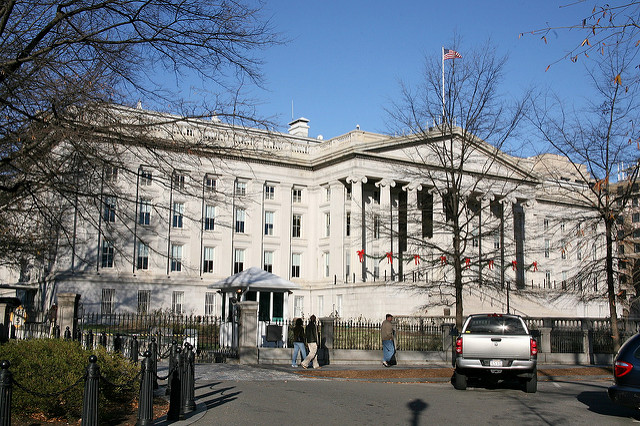
Steven Mnuchin continues to advance in U.S. Senate even as Democrats decry his role during financial crisis.
From the moment President Donald Trump nominated Steven Mnuchin as the next Secretary of the U.S. Department of the Treasury, Democrats have attempted to portray the Goldman Sachs alumnus and hedge fund manager as the financial crisis incarnate. Elizabeth Warren conveyed the most creative rendition of this when she decried “Steve Mnuchin is the Forrest Gump of the financial crisis—he managed to participate in all the worst practices on Wall Street.”
Yet it is Mnuchin’s management of a so-called “foreclosure machine” during the financial crisis that has raised the most political raucous because that management reportedly involved a deceptive practice known as “robo-signing.” Despite recent reports that give credence to these accusations, Republicans have pushed forward with Mnuchin’s nomination—even slashing Senate rules to thrust the process forward to a final vote.
Mnuchin’s political headache stems from his position as Chairman and CEO of OneWest Bank. OneWest is the new name of the distressed California-based bank IndyMac that Mnuchin and a group of billionaire investors bought from the Federal Deposit Insurance Corporation in 2009. Given that the bank foreclosed on over 36,000 homeowners, Kevin Stein—Deputy Director of the California Reinvestment Coalition—argued that Mnuchin sought to make profit at the expense of suffering California homeowners. He also dubbed OneWest as a “foreclosure machine,” a term that has since gone viral in its association with Mnuchin.
During live testimony to the Senate, Mnuchin denied that OneWest operated as a foreclosure machine, arguing “nothing could be further from the truth.” Instead, Mnuchin claimed that he “was committed to loan modifications intended to stop foreclosures” and that—if anything—OneWest actually “ran a ‘Loan Modification Machine.’”
In a recent article published in the Wall Street Journal, two former FDIC employees who worked closely with the IndyMac deal also defended Mnuchin’s role at OneWest. John Bovenzi—former deputy to the Chairman of the FDIC—and Jim Wigand—a former Deputy Director at the FDIC who directed the sale of IndyMac—argued that Mnuchin and his team of billionaires bought IndyMac “fair and square,” and actually helped lower the FDIC’s losses from insuring the bank.
Even if OneWest was not a foreclosure machine, however, there are still unanswered claims stemming from mounting evidence that OneWest engaged in “robo-signing.”
Robo-signing is a deceptive practice that developed in the aftermath of the 2008 housing collapse when the number of foreclosure filings in the United States skyrocketed. During this period, banks sought ways to rush “delinquent borrowers out of their homes as quickly as possible.” As a result, some bank employees conducted “sloppy and cursory” review of documents before signing them—a practice now known as robo-signing. Some robo-signers testified during depositions that they would sign up to 400 foreclosure documents a day, sometimes without reading a single page.
In a list of written questions sent to the Treasury nominee, the U.S. Senate Finance Committee (“Finance Committee”) asked Mnuchin if OneWest had engaged in robo-signing. Relying on a report from the Office of Comptroller of the Currency, Mnuchin responded that “OneWest Bank did not ‘robo-sign’ documents.”
Yet some reports seem to point to the contrary. One piece of evidence is a 2009 court deposition of Erica Johnson-Seck—a vice president of bankruptcy and foreclosure under Mnuchin’s leadership. In the deposition, Johnson-Seck admitted to signing around roughly 750 foreclosure documents per week—even shortening her signature to “just an E” so that she could sign paperwork faster. Johnson-Seck also admitted that she did not read every document that she signed.
Mnuchin’s spokesman, Barney Keller, argued that courts frequently upheld Johnson-Seck’s work and claimed “[t]he media is picking on a hard-working bank employee whose reputation has been maligned.” Yet Marc Dann, former Ohio Attorney General and attorney for homeowners in foreclosure, argued “Keller misses the point.” Dann argued that Johnson-Seck’s practice, regardless of how the courts upheld them, “was robo-signing, and this is what our future Treasury secretary said OneWest didn’t do.”
Aside from raising questions about his credibility, Mnuchin’s alleged robo-signing practices are also of particular concern given Trump’s aim to dismantle the Dodd-Frank Act and to target the Consumer Financial Protection Bureau (“CFPB”). One of CFPB’s primary missions is to “protect families from unfair, deceptive, and abusive financial practices.” Although robo-signing and other bad practices in the mortgage industry might have contributed the CFPB’s creation, the agency has also monitored robo-signing within other arenas, including the payday lending and credit card debt collection industries.
Senate Finance Democrats manifested their opposition to Mnuchin’s nomination by “boycotting” the committee vote that precedes the entire senate vote. Given that the Finance Committee’s quorum rules dictate that at least one member of the opposing party must be present to hold a vote, the Democrats’ boycott was a strategic maneuver to bar Mnuchin’s possible approval.
When asked about the boycott, Senator Sherrod Brown (D-Ohio) stated that the committee Democrats had “great concern” about voting for a nominee that “out-and-out lied to our committee.”
The move infuriated Finance Committee Chairman Orrin Hatch (R-Utah), who called the political maneuver “pathetic.” In response, Senator Hatch suspended the quorum requirement for the first time in Senate Finance Committee history and held a vote for Mnuchin with no Democrats present—resulting in a 14-0 tally in favor of Mnuchin’s advancement.
Senator Hatch argued that since his “colleagues took the unprecedented step of boycotting a Finance Committee vote on nominations,” he and his fellow Finance Committee Republicans were obligated to take “some unprecedented actions” in response.
In a touch of irony, the suspension of the quorum requirement comes roughly two months after Mnuchin made a cameo appearance in a movie he financed last year—“Rules Don’t Apply.” Regardless of whether “rules don’t apply” is a mantra that Mnuchin endorses, it will almost certainly be one that Democrats will continue to associate with him.
The image of the Treasury Department is used under a Creative Commons License.



